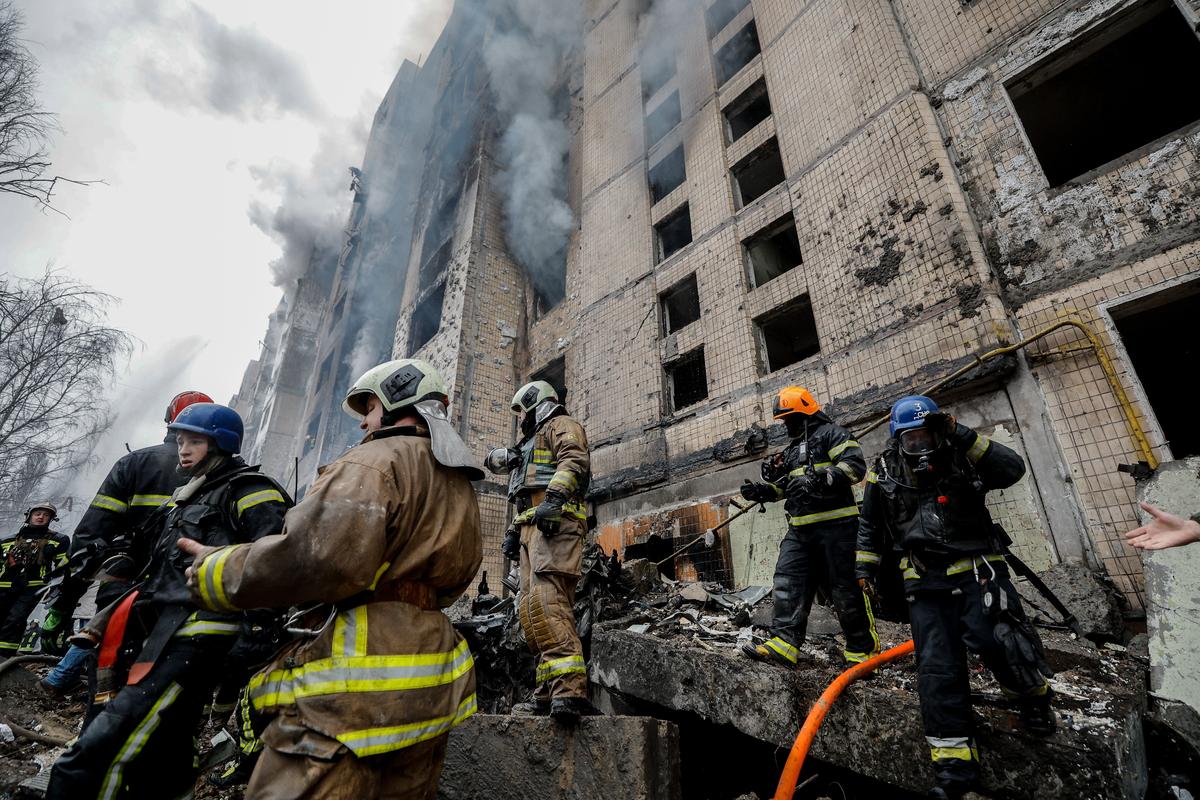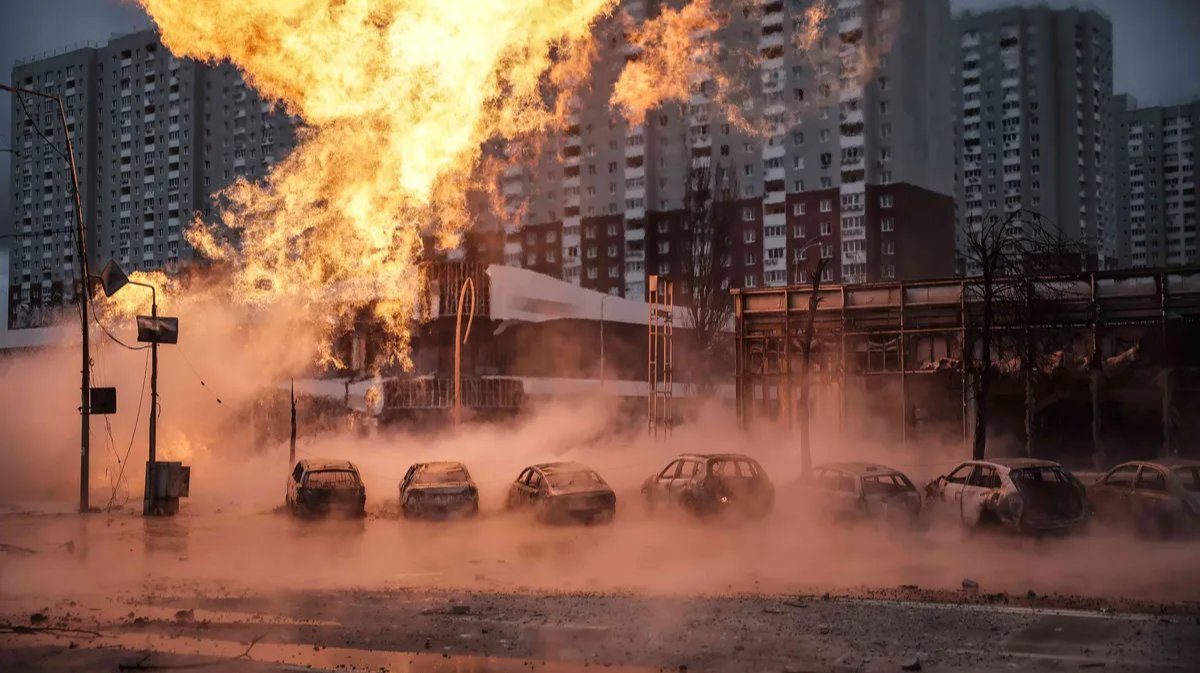When my editors asked me for a column about the Russian attack on Kyiv on 2 January, I refused, despite knowing that by reporting what’s going on in Ukraine, we allow those elsewhere in the world to learn what’s going on here, and prevent others from simply forgetting about the war.
My refusal was based on having no new thoughts or feelings to convey. I’m burnt out, like an old light bulb. The first time you experience and describe the horror of war with the eyes of a civilian, you try not to miss a single detail. But now that the horror has become routine, I’m no longer sure how to engage the reader.
On 2 January, the Russian armed forces attacked Kyiv, first with Shahed drones and then, at dawn, 99 different missiles coming from different directions. On my phone, I read dozens of Ukrainian Telegram channels reporting what exactly was flying through the air in real time, including towards my 10-storey building. There were MiG fighter aircraft firing ballistic missiles, Kalibr cruise missiles coming from the Black Sea, Iskander ballistic missiles from the north, as well as some anti-radar air-to-surface missiles whose origin I no longer recall.
Maybe readers are interested in knowing what an approaching missile sounds like? In the darkness of my apartment (electricity in the city went off during the attack, followed by the water and heating), the whistling got louder. It didn’t last long, probably a few seconds. My cat and I hid in the bathroom, where there are no windows. Why in the bathroom, and not in the shelter in the new building next door or at least the car park, through the courtyard and across the road?
When an Iskander is launched from the Bryansk region bordering Ukraine, it takes three minutes or so for it to reach Kyiv.
I couldn’t get anywhere in three minutes. I wouldn’t make it down from the sixth floor, even if I’d dozed off wearing a tracksuit and trainers. And out in the open, you’re much more likely to be struck by shrapnel and be unable to go anywhere ever again, that’s why.
My cat was shaking, biting, retching. “Shh,” I whispered. “It’s all right, they’ll be shot down now, you’ll see!”
The fear becomes easier to manage when you’re with someone more defenceless than yourself. The windows shook. There was a physical sensation of something heavy just above the roof. There was a loud shot, followed by a bang, so our air defence was working. The whole house shuddered, just like the cat.
We were safe this time, lucky. I scrolled through my Telegram channels. No, it wasn’t over yet. The next batch of missiles had already entered our airspace.
In August, I went to the Ukrainian city of Poltava to write a report from the legendary airbase there that played a key role in the allied Operation Frantic in 1944. Walking around the airfield I saw the latest versions of the Tupolev Tu-160, Tu-95MS and Tu-22M3 strategic bombers. Ukraine was forced either to scrap the remainders or give them to Russia under a 1994 agreement signed in the Kremlin by Bill Clinton, Boris Yeltsin and Leonid Kravchuk. Even in the August heat, the display rockets that hung from the wings of display bombers were cold to the touch. I deliberately placed my hands on them to remember the sensation.
Russia is now using the same aircraft and Soviet “high-precision” weaponry to attack Ukrainian cities. A completely stupid thought popped into my mind: was the missile whose whistle was still ringing in my ears one of those that I had touched in Poltava? Or a brand new one, fresh off the assembly line?
According to data from Ukrainian military website Defense Express, the Russians used Kh-101 missiles, manufactured in the fourth quarter of 2023, to attack Kyiv on 2 January. This they established by deciphering a serial number found among its fragments.
Another alarm went off on my phone. A new volley of missiles was on its way, Mayor Klitschko told me, adding that casualties and destruction had been reported in almost every part of the capital. I don’t even want to imagine how we might have fared without the Patriot surface-to-air missile systems and the capital’s brilliant air defences.
But Kyiv was lucky compared to Kharkiv or Dnipro: there aren’t enough Patriots to go round.
The news was bad. A high-rise building was on fire, with a crater next to it. Residents were being pulled from the flames and the rubble. Many were taken away by ambulance. Initial reports said simply that an elderly woman with injuries died on her way to hospital. A few hours later, I discovered that the Russian terrorist attack had in fact killed Lyudmyla Shevtsova, an 84-year-old professor who taught at the Kyiv-Mohyla Academy.

Rescuers work at the site of a damaged building after a missile strike in Kyiv, Ukraine, 02 January 2024. Photo: EPA-EFE/SERGEY DOLZHENKO
The cat and I went into the bathroom to breakfast on dry food and a sandwich, all the while listening carefully: one bang, then another, but some way off. Oh, but the next one was closer. Should I open the front door now so that it won’t jam, have my jacket and pet-carrier at the ready? The rest of the apartment is still dangerous: a blast wave usually takes out windows and balconies, and starts fires. It would be good not to get stuck in the hall.
I read on Facebook that Yuna, a two-year-old African lioness being looked after by Help Animals of Ukraine outside Kyiv was unable to leave her enclosure. A fragment of a downed missile had landed nearby, concussing her and leaving her unable to get back on her feet.
By 10 AM, there was deafening silence. A little over an hour later, the fridge rumbled back to life and the radiators began to give off heat again. The repairmen had worked wonders.
Join us in rebuilding Novaya Gazeta Europe
The Russian government has banned independent media. We were forced to leave our country in order to keep doing our job, telling our readers about what is going on Russia, Ukraine and Europe.
We will continue fighting against warfare and dictatorship. We believe that freedom of speech is the most efficient antidote against tyranny. Support us financially to help us fight for peace and freedom.
By clicking the Support button, you agree to the processing of your personal data.
To cancel a regular donation, please write to [email protected]

